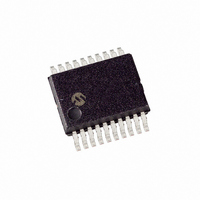PIC18F1320-I/SS Microchip Technology, PIC18F1320-I/SS Datasheet - Page 170

PIC18F1320-I/SS
Manufacturer Part Number
PIC18F1320-I/SS
Description
IC MCU FLASH 4KX16 A/D 20SSOP
Manufacturer
Microchip Technology
Series
PIC® 18Fr
Datasheets
1.PIC16F616T-ISL.pdf
(8 pages)
2.PIC18F1220-ISO.pdf
(308 pages)
3.PIC18F1220-ISO.pdf
(8 pages)
4.PIC18F1220-ISO.pdf
(6 pages)
5.PIC18F1220-ISO.pdf
(10 pages)
6.PIC18F1220-ISO.pdf
(4 pages)
7.PIC18F1320-ISS.pdf
(36 pages)
Specifications of PIC18F1320-I/SS
Core Size
8-Bit
Program Memory Size
8KB (4K x 16)
Core Processor
PIC
Speed
40MHz
Connectivity
UART/USART
Peripherals
Brown-out Detect/Reset, LVD, POR, PWM, WDT
Number Of I /o
16
Program Memory Type
FLASH
Eeprom Size
256 x 8
Ram Size
256 x 8
Voltage - Supply (vcc/vdd)
4.2 V ~ 5.5 V
Data Converters
A/D 7x10b
Oscillator Type
Internal
Operating Temperature
-40°C ~ 85°C
Package / Case
20-SSOP
Controller Family/series
PIC18
No. Of I/o's
16
Eeprom Memory Size
256Byte
Ram Memory Size
256Byte
Cpu Speed
40MHz
No. Of Timers
4
Processor Series
PIC18F
Core
PIC
Data Bus Width
8 bit
Data Ram Size
256 B
Interface Type
EUSART
Maximum Clock Frequency
40 MHz
Number Of Programmable I/os
16
Number Of Timers
1 x 16 bit
Operating Supply Voltage
2 V to 5.5 V
Maximum Operating Temperature
+ 85 C
Mounting Style
SMD/SMT
3rd Party Development Tools
52715-96, 52716-328, 52717-734, 52712-325, EWPIC18
Development Tools By Supplier
PG164130, DV164035, DV244005, DV164005, PG164120, ICE2000, ICE4000, DM163014, DV164136
Minimum Operating Temperature
- 40 C
On-chip Adc
7 bit
Package
20SSOP
Device Core
PIC
Family Name
PIC18
Maximum Speed
40 MHz
Lead Free Status / RoHS Status
Lead free / RoHS Compliant
For Use With
XLT20SS-1 - SOCKET TRANSITION 18DIP 20SSOPAC164307 - MODULE SKT FOR PM3 28SSOPAC164018 - MODULE SKT PROMATEII 20SSOP
Lead Free Status / Rohs Status
Details
Available stocks
Company
Part Number
Manufacturer
Quantity
Price
Part Number:
PIC18F1320-I/SS
Manufacturer:
MIC
Quantity:
20 000
- PIC16F616T-ISL PDF datasheet
- PIC18F1220-ISO PDF datasheet #2
- PIC18F1220-ISO PDF datasheet #3
- PIC18F1220-ISO PDF datasheet #4
- PIC18F1220-ISO PDF datasheet #5
- PIC18F1220-ISO PDF datasheet #6
- PIC18F1320-ISS PDF datasheet #7
- Current page: 170 of 308
- Download datasheet (5Mb)
PIC18F1220/1320
18.2
Depending on the power source for the device voltage,
the voltage normally decreases relatively slowly. This
means that the LVD module does not need to be
constantly operating. To decrease the current require-
ments, the LVD circuitry only needs to be enabled for
short periods, where the voltage is checked. After
doing the check, the LVD module may be disabled.
Each time that the LVD module is enabled, the circuitry
requires some time to stabilize. After the circuitry has
stabilized, all status flags may be cleared. The module
will then indicate the proper state of the system.
FIGURE 18-4:
DS39605F-page 168
Internally Generated
Internally Generated
CASE 1:
CASE 2:
Reference Stable
Reference Stable
Operation
Enable LVD
Enable LVD
LVDIF
LVDIF
V
V
DD
DD
LOW-VOLTAGE DETECT WAVEFORMS
T
T
IVRST
IVRST
LVDIF may not be set.
The following steps are needed to set up the LVD
module:
1.
2.
3.
4.
5.
6.
Figure 18-4 shows typical waveforms that the LVD
module may be used to detect.
LVDIF cleared in software,
LVDIF remains set since LVD condition still exists
Write the value to the LVDL3:LVDL0 bits
(LVDCON register), which selects the desired
LVD trip point.
Ensure that LVD interrupts are disabled (the
LVDIE bit is cleared or the GIE bit is cleared).
Enable the LVD module (set the LVDEN bit in
the LVDCON register).
Wait for the LVD module to stabilize (the IRVST
bit to become set).
Clear the LVD interrupt flag, which may have
falsely become set, until the LVD module has
stabilized (clear the LVDIF bit).
Enable the LVD interrupt (set the LVDIE and the
GIE bits).
LVDIF cleared in software
© 2007 Microchip Technology Inc.
LVDIF cleared in software
V
V
LVD
LVD
Related parts for PIC18F1320-I/SS
Image
Part Number
Description
Manufacturer
Datasheet
Request
R

Part Number:
Description:
20-Pin USB Flash Microcontrollers
Manufacturer:
MICROCHIP [Microchip Technology]
Datasheet:

Part Number:
Description:
PIC18F With 128-segment LCD Driver And 12-bit ADC, 8KB Flash, 768B RAM, CCP, MSS
Manufacturer:
Microchip Technology
Datasheet:

Part Number:
Description:
PIC18F With 128-segment LCD Driver And 12-bit ADC, 16KB Flash, 768B RAM, CCP, MS
Manufacturer:
Microchip Technology
Datasheet:

Part Number:
Description:
PIC18F With 192-segment LCD Driver And 12-bit ADC, 8KB Flash, 768B RAM, CCP, MSS
Manufacturer:
Microchip Technology
Datasheet:

Part Number:
Description:
PIC18F With 192-segment LCD Driver And 12-bit ADC, 16KB Flash, 768B RAM, CCP, MS
Manufacturer:
Microchip Technology
Datasheet:

Part Number:
Description:
Microcontrollers (MCU) 48KB 3328 RAM 52 I/O
Manufacturer:
Microchip Technology
Datasheet:

Part Number:
Description:
Microcontrollers (MCU) 64KB 3328 RAM 52 I/O
Manufacturer:
Microchip Technology
Datasheet:

Part Number:
Description:
32kB Flash, 2kB RAM, 1kB EE, NanoWatt XLP, LCD 64 QFN 9x9x0.9mm T/R
Manufacturer:
Microchip Technology
Datasheet:

Part Number:
Description:
32kB Flash, 2kB RAM, 1kB EE, NanoWatt XLP, LCD 64 TQFP 10x10x1mm T/R
Manufacturer:
Microchip Technology
Datasheet:

Part Number:
Description:
128kB Flash, 4kB RAM, 1kB EE, 16MIPS, NanoWatt XLP, LCD, 5V 80 TQFP 12x12x1mm T/
Manufacturer:
Microchip Technology
Datasheet:

Part Number:
Description:
32kB Flash, 2kB RAM, 1kB EE, NanoWatt XLP, LCD 64 QFN 9x9x0.9mm TUBE
Manufacturer:
Microchip Technology
Datasheet:

Part Number:
Description:
32kB Flash, 2kB RAM, 1kB EE, NanoWatt XLP, LCD 64 TQFP 10x10x1mm TRAY
Manufacturer:
Microchip Technology

Part Number:
Description:
128kB Flash, 4kB RAM, 1kB EE, 16MIPS, NanoWatt XLP, LCD, 5V 80 TQFP 12x12x1mm TR
Manufacturer:
Microchip Technology












